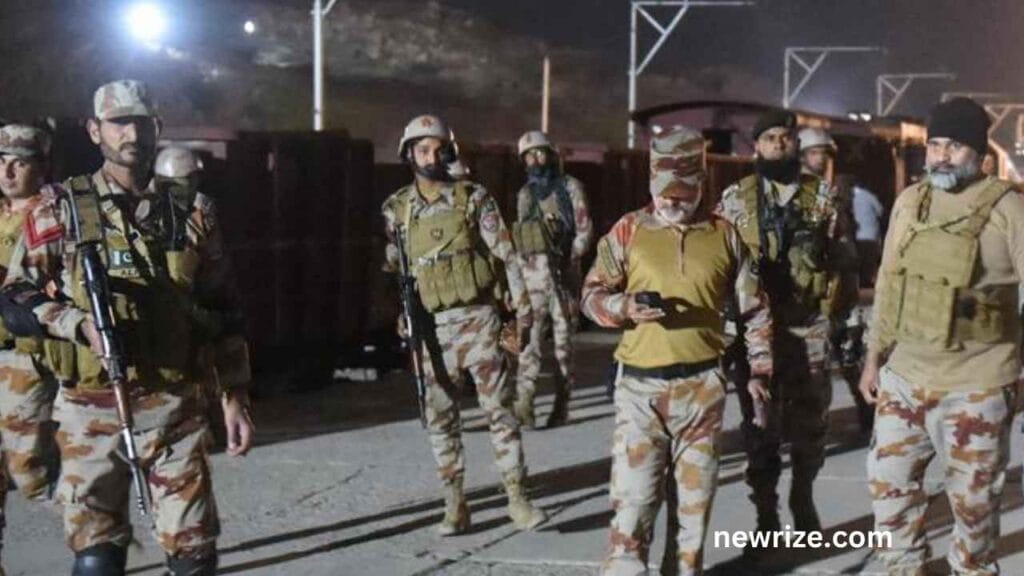In a disturbing escalation of insurgency in Pakistan, the Baloch Liberation Army (BLA) recently hijacked a passenger train in Balochistan. This shocking incident has raised serious security concerns, not just for Pakistan but also for foreign investors and regional stability. While security forces managed to regain control, the event has sparked intense discussions about terrorism, railway security, and the ongoing Baloch separatist movement.
In this article, we will delve deep into what happened, the motives behind the attack, the history of BLA, the implications of such incidents, and what Pakistan must do to prevent future attacks.
What Really Happened?
According to reports, the hijacking occurred on March 2025, when heavily armed militants stopped Jaffar Express, a passenger train traveling through Mach, Balochistan. The attackers, belonging to the Baloch Liberation Army, forced the train to stop, took several passengers hostage, and engaged in a standoff with security forces.

How Did the Attack Unfold?
- Train Ambush: The BLA militants stopped the train in a remote area where security presence was minimal.
- Hostage Situation: They took several passengers hostage, using them as a shield against security forces.
- Gunfire & Standoff: Security forces quickly arrived at the scene, leading to a tense gun battle with the militants.
- Rescue Operation: After hours of intense fighting, the Pakistan Army, FC (Frontier Corps), and local police successfully rescued the hostages and neutralized the attackers.
The attack was a well-coordinated and pre-planned move by the BLA, showing their increasing capability to target vital infrastructure.
Read Also: Top 10 Best Home Security Systems of 2025
Who is the Baloch Liberation Army (BLA)?
The Baloch Liberation Army (BLA) is a militant separatist group fighting for Balochistan’s independence from Pakistan. The group has been active for decades, carrying out attacks on security forces, government officials, and infrastructure projects, particularly those related to the China-Pakistan Economic Corridor (CPEC).
Why Does the BLA Exist?
The BLA claims to fight against what they see as the exploitation of Balochistan’s natural resources and the suppression of Baloch identity. Their major grievances include:
- Economic Exploitation – The BLA accuses the Pakistani government of extracting Balochistan’s rich natural resources (gas, minerals, and gold) without benefiting local people.
- Lack of Political Representation – The group argues that Balochistan is governed by Islamabad with little local representation.
- Opposition to CPEC – The BLA opposes Chinese investments in Balochistan, claiming they benefit only the government and military, not the local population.
- Alleged Human Rights Violations – The group blames the Pakistan Army for enforced disappearances, military operations, and extra-judicial killings of Baloch activists.
Why Did the BLA Hijack a Train?
While the BLA has attacked military convoys and infrastructure before, a train hijacking is an unusual and dangerous escalation. Experts suggest several possible reasons behind this attack:
- Terror Tactic for Global Attention – Hijacking a passenger train is a dramatic move, designed to attract international media coverage.
- Pressure on the Government – The attack might be a warning to Pakistani authorities to stop military operations in Balochistan.
- Retaliation Against Military Actions – The BLA might be responding to recent military operations that targeted its members.
- Disrupting CPEC & China’s Investments – By targeting national infrastructure, the BLA aims to scare off foreign investors, particularly Chinese companies involved in Balochistan.
Security & National Implications
The train hijacking highlights serious gaps in Pakistan’s internal security. If a passenger train can be hijacked in broad daylight, it raises questions about how safe other forms of transport and national assets are.
1. Weak Railway Security
- Pakistan’s railways have long been vulnerable to sabotage and attacks.
- There is little to no security in remote areas, making trains easy targets for militants.
- This hijacking exposes the urgent need for armed guards and enhanced security on railway routes.
2. Rising Baloch Insurgency
- The BLA’s attack signals that the insurgency is getting stronger.
- Increased attacks could lead to more instability in Balochistan and threaten regional security.
3. Threat to China-Pakistan Economic Corridor (CPEC)
- Balochistan is a key region in the multi-billion-dollar CPEC project.
- The attack may discourage Chinese investors, slowing down development projects.
4. Pakistan’s Counterterrorism Efforts Under Scrutiny
- Despite years of counterterrorism operations, militant groups like the BLA continue to strike critical infrastructure.
- The government needs to rethink its strategy to counter the growing insurgency effectively.
How Can Pakistan Prevent Future Attacks?
1. Improve Railway Security
- Deploy armed guards on trains traveling through high-risk areas.
- Install CCTV cameras and security checkpoints at major railway stations.
- Use drones and surveillance systems to monitor railway routes.
2. Strengthen Counterterrorism Operations
- Intelligence agencies must track and intercept BLA plans before execution.
- Military operations must target key insurgent leaders while avoiding collateral damage.
3. Address Balochistan’s Grievances
- The government should invest in Balochistan’s development to win over local support.
- More political representation for Baloch people can reduce feelings of alienation.
- Human rights concerns must be addressed to prevent radicalization.
Conclusion
The Baloch Liberation Army’s hijacking of a passenger train marks a dangerous new phase in the Baloch insurgency. While security forces successfully neutralized the threat, the attack raises alarm about Pakistan’s internal security, railway vulnerabilities, and the ongoing insurgency in Balochistan.
To prevent future attacks, Pakistan must tighten security, engage in meaningful dialogue with Baloch leaders, and address the root causes of insurgency. If left unchecked, such incidents could severely impact national stability, economic progress, and Pakistan’s international image.





